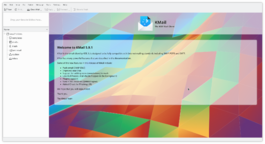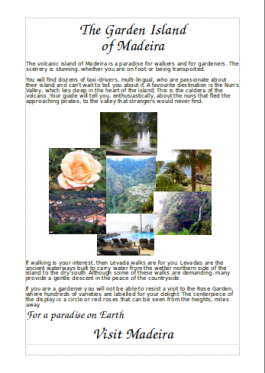User:Annew: Difference between revisions
mNo edit summary |
mNo edit summary |
||
| Line 51: | Line 51: | ||
---- | ---- | ||
= | =Second Layout Project - for a photo album= | ||
{{Template:I18n/Language Navigation Bar|KWord/Layout2}} | {{Template:I18n/Language Navigation Bar|KWord/Layout2}} | ||
{| | {| | ||
|[[Image:KWordLayoutTut2.png|thumb|265px|A | |[[Image:KWordLayoutTut2.png|thumb|265px|A Second Layout Project]]|| In our second Layout Tutorial you will use your own pictures and text | ||
|} | |} | ||
| Line 65: | Line 65: | ||
::* adjust their size and position | ::* adjust their size and position | ||
You will create a page suitable for use in a photo album, using text flow between frames. | You will create a page suitable for use in a photo album, using text flow between frames. We will base this on holiday photos. | ||
Before you start you may find it helpful to create a temporary folder containing all the pictures you intend to use. For the purpose of this tutorial you should scale your pictures to no more than 125mm (5in) wide as inserting large images has an impact on printing time. | Before you start you may find it helpful to create a temporary folder containing all the pictures you intend to use. For the purpose of this tutorial you should scale your pictures to no more than 125mm (5in) wide as inserting large images has an impact on printing time. | ||
As in our first layout project, select the blank page template and adjust your margins. Plenty of white space is advisable in a photo album page, but if your margins are too large you will find that either the pictures or text suffer from lack of space. | As in our first layout project, select the blank page template and adjust your margins. Plenty of white space is advisable in a photo album page, but if your margins are too large you will find that either the pictures or text suffer from lack of space. | ||
First, create two Image boxes. Place the first just under the title, and touching the right-hand margin. In that one, place a photo that is typical of your destination. Place a feature photo touching the left-hand margin, approximately corner-to-corner with the first photo. | |||
Revision as of 19:57, 31 May 2009
Saved for re-use: Template:I18n/Language Navigation Bar
 |
KMail is the email component of Kontact, the integrated personal information manager of KDE. |
Image map:
KWord
|
kwrite ftp://ftp.kde.org/pub/kde/Welcome.msg |
Second Layout Project - for a photo album
Template:I18n/Language Navigation Bar
 |
In our second Layout Tutorial you will use your own pictures and text |
In this lesson you will revise the steps of the first tutorial:
- add text boxes and adjust their size and position
- format text
- add illustrations
- adjust their size and position
You will create a page suitable for use in a photo album, using text flow between frames. We will base this on holiday photos.
Before you start you may find it helpful to create a temporary folder containing all the pictures you intend to use. For the purpose of this tutorial you should scale your pictures to no more than 125mm (5in) wide as inserting large images has an impact on printing time.
As in our first layout project, select the blank page template and adjust your margins. Plenty of white space is advisable in a photo album page, but if your margins are too large you will find that either the pictures or text suffer from lack of space.
First, create two Image boxes. Place the first just under the title, and touching the right-hand margin. In that one, place a photo that is typical of your destination. Place a feature photo touching the left-hand margin, approximately corner-to-corner with the first photo.



